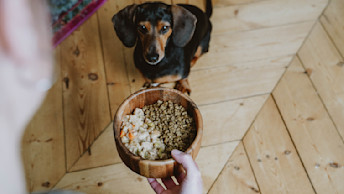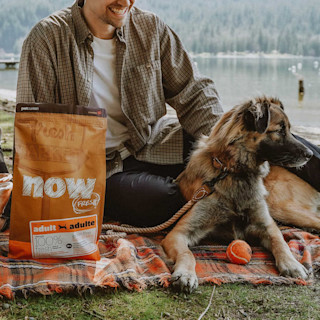May 6, 2024
What to Know When Transitioning Dog Food

Have you noticed your pup's gaze lingering on their dinner bowl, perhaps hinting they're ready for a change? At Now Fresh, we understand that adjusting your dog's diet may be driven by both love and concern for their wellbeing. Whether it's seeking options that are simply better tasting, more nutritious, or both, ensuring their continual health and happiness is what leads many pet parents to transition their dog’s diet.
What Happens if I Change Dog Food Too Quickly?
We've all felt the repercussions of dietary indiscretion, and our canine companions are no exception. A quick change in their diet can unsettle their stomachs, and we don’t want that. The signs? Think of the usual suspects: generally, vomiting and loose stools, or even a sudden bout of constipation. That’s why we’ve created this step-by-step guide to transition your dog’s food, tailor-made for digestive comfort.
Symptoms of changing dog food too quickly:
- Gastrointestinal upset including vomiting and diarrhea
- Regurgitation after eating
- Decreased appetite
- Constipation
How to Transition Dog Food Safely
Remember, it’s not a race. Here’s how you and your furry friend can transition with the unruffled ease of a leisurely stroll through the park:
Day 1 & 2: Feed 80% of your dog’s old food with 20% of the new food
Day 3 & 4: Feed 60% of your dog’s old food with 40% of the new food
Day 5 & 6: Feed 40% of your dog’s old food with 60% of the new food
Day 7, 8 & 9: Feed 20% of your dog’s old food with 80% of the new food
Day 10 & so on: Feed 100% new food

Each pet is unique; monitor your dog’s response and be ready to ease the pace if needed. A good way to judge is to carefully monitor how your dog is reacting with the transition. If you notice that your dog is showing signs of constipation, diarrhea, or a change in appetite, you need to take the process even slower.
Make sure your dog is always hydrated and limit treats and other outside food during the process to help the change go smoothly.
In Conclusion
Just as variety is the spice of life for us, it is for our curious canines too. Introducing new flavors to your dog's mealtimes is a great way to keep things interesting for them. You're not just switching foods; you're enriching your dog's world, one nutritious meal at a time.

Our Recommendation
Now Fresh Premium Dog Food
At Now Fresh we don’t want mealtimes to be boring, which is why we offer a range of different textures and flavors for dogs to enjoy! Made by experts with fresh meats and tasty fruits and veggies.
View dog food

